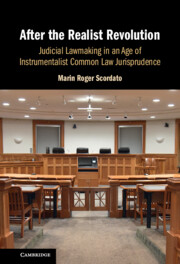 After the Realist Revolution
After the Realist Revolution Published online by Cambridge University Press: 02 May 2025
Using the Tarasoff case as an exemplar, this chapter identifies and discusses a number of specific ways in which modern instrumentalist legal analysis is burdened and compromised when conducted within the structure, and according to the procedures, of current appellate adjudication. This is the case because this structure and these procedures are, in large part, vestiges of the earlier formalist period, unchanged for well more than a century.
The selection of appellate judges on an assertedly merit basis, and not by popular election, is a means of appointing judges far more in harmony with a formalist jurisprudential paradigm than with an instrumentalist one. The exceptionally limited number and kind of inputs that are involved in appellate adjudication are far more in line with formalism than instrumentalism. The kind of empirical information that is routinely excluded from the record of a case at trial, and thus denied to appellate courts, by various rules of evidence and privilege is often information that would be useful and valuable to the appellate courts when engaging in instrumentalist common law analysis. These are procedural rules that made sense within a formalist framework that operated far more problematically in the modern instrumentalist era.
To save this book to your Kindle, first ensure [email protected] is added to your Approved Personal Document E-mail List under your Personal Document Settings on the Manage Your Content and Devices page of your Amazon account. Then enter the ‘name’ part of your Kindle email address below. Find out more about saving to your Kindle.
Note you can select to save to either the @free.kindle.com or @kindle.com variations. ‘@free.kindle.com’ emails are free but can only be saved to your device when it is connected to wi-fi. ‘@kindle.com’ emails can be delivered even when you are not connected to wi-fi, but note that service fees apply.
Find out more about the Kindle Personal Document Service.
To save content items to your account, please confirm that you agree to abide by our usage policies. If this is the first time you use this feature, you will be asked to authorise Cambridge Core to connect with your account. Find out more about saving content to Dropbox.
To save content items to your account, please confirm that you agree to abide by our usage policies. If this is the first time you use this feature, you will be asked to authorise Cambridge Core to connect with your account. Find out more about saving content to Google Drive.